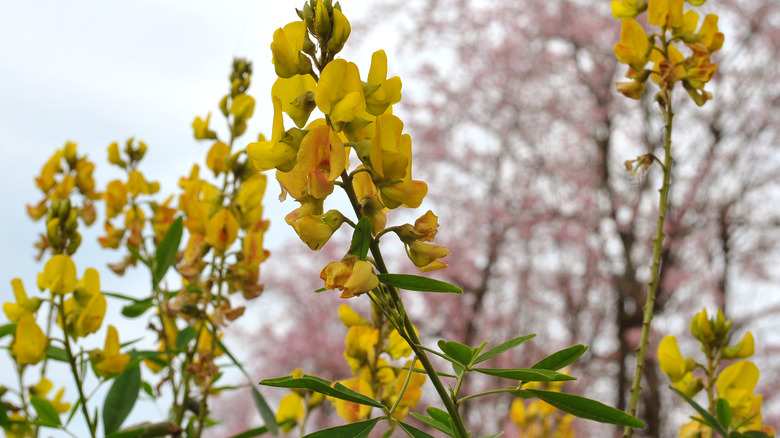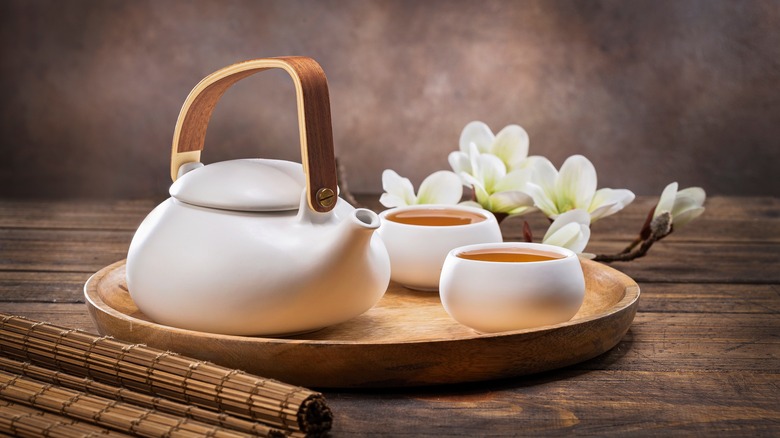These Are The Health Benefits Of Honeybush Tea
If you're hip to holistic healthcare, you may be wondering about the health benefits of honeybush tea. Honeybush 'tea' is an herbal drink made from the honeybush shrub or the Cyclopia plant. Unlike traditional black tea or green tea, honeybush tea is not made from Camellia sinensis, so the herbal drink has no tannins or caffeine, and is in fact technically not 'tea' in the traditional sense (per Verywell Fit).
There are approximately 20 species of the cyclopia plant, but according to WebMD, only a few are used to make the herbal drink. The plant is known for its woody stems and small yellow flowers (via Healthline). It is exclusively found growing in the coastal and mountainous Western and Eastern Cape regions of South Africa (via WebMD).
The plant is said to have a sweet smell, resembling that of honey, which lends the plant its name, according to Verywell Fit. The drink is described as having a roasted, sweet, lightly floral flavor. The brew can be enjoyed as a hot or cold drink. Aside from being a pleasing and earthy beverage, honeybush tea may also offer a few health benefits.
What is healthy about honeybush tea?
While the health benefits of honeybush tea haven't been fully studied, there may be some positive effects of consuming the tea. According to WebMD, one cup of honeybush tea is said to contain trace amounts of iron, potassium, calcium, copper, zinc, magnesium, and manganese. Additionally, the beverage has no carbs, no sugar, and no fat.
Moreover, honeybush tea is packed with antioxidants known as polyphenols (per Healthline). More specifically, honeybush tea has been found to have a subgroup of polyphenols known as mangiferin. A 2017 study in Lipids in Health and Diseases referred to mangiferin as a 'miracle bioactive compound', illustrating the antioxidant, antimicrobial, antidiabetic, antiallergic, anticancer, hypocholesterolemic, and immunomodulatory properties of the compound. While the compound is most commonly found in the peel, leaves, and twigs of mango trees, its presence in honeybush tea lends some interesting health claims. Here are a few.
Possible health benefits
The presence of mangiferin, along with another compound pinitol, is said to have the ability to lower blood sugar, lending aid in diabetes management, according to Mandela Tea. Pinitol also provides an expectorant effect, which can provide relief for individuals dealing with phlegm and coughs, according to WebMD. Meanwhile, the potential anti-inflammatory properties of the compounds within honeybush tea may provide assistance with illnesses such as irritable bowel syndrome (IBS), rheumatoid arthritis, and even promote heart health.
Another benefit said to be linked to honeybush tea is relieving symptoms associated with menopause due to the presence of isoflavone which, according to Healthline, may mimic the body's natural hormone estrogen. The herbal remedy is also suggested to be a good addition to any weight loss plan, as the tea has properties that might inhibit fat storage. It may also enhance bone and skin health.
So if you're looking for a fresh, new, beverage that might add a few holistic health benefits to your daily life, a cup of honeybush tea may be just the thing that's needed. While more research is needed on its potential benefits, it likely won't hurt to try this holistic herbal beverage. As with all practices, it is best to consult with your physician before incorporating any new supplement or herbal practice into your routine, especially since it may interact with certain medications.



